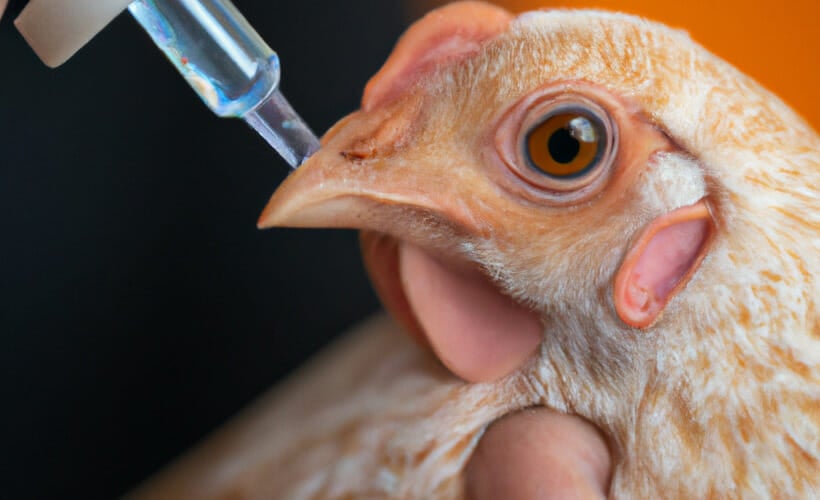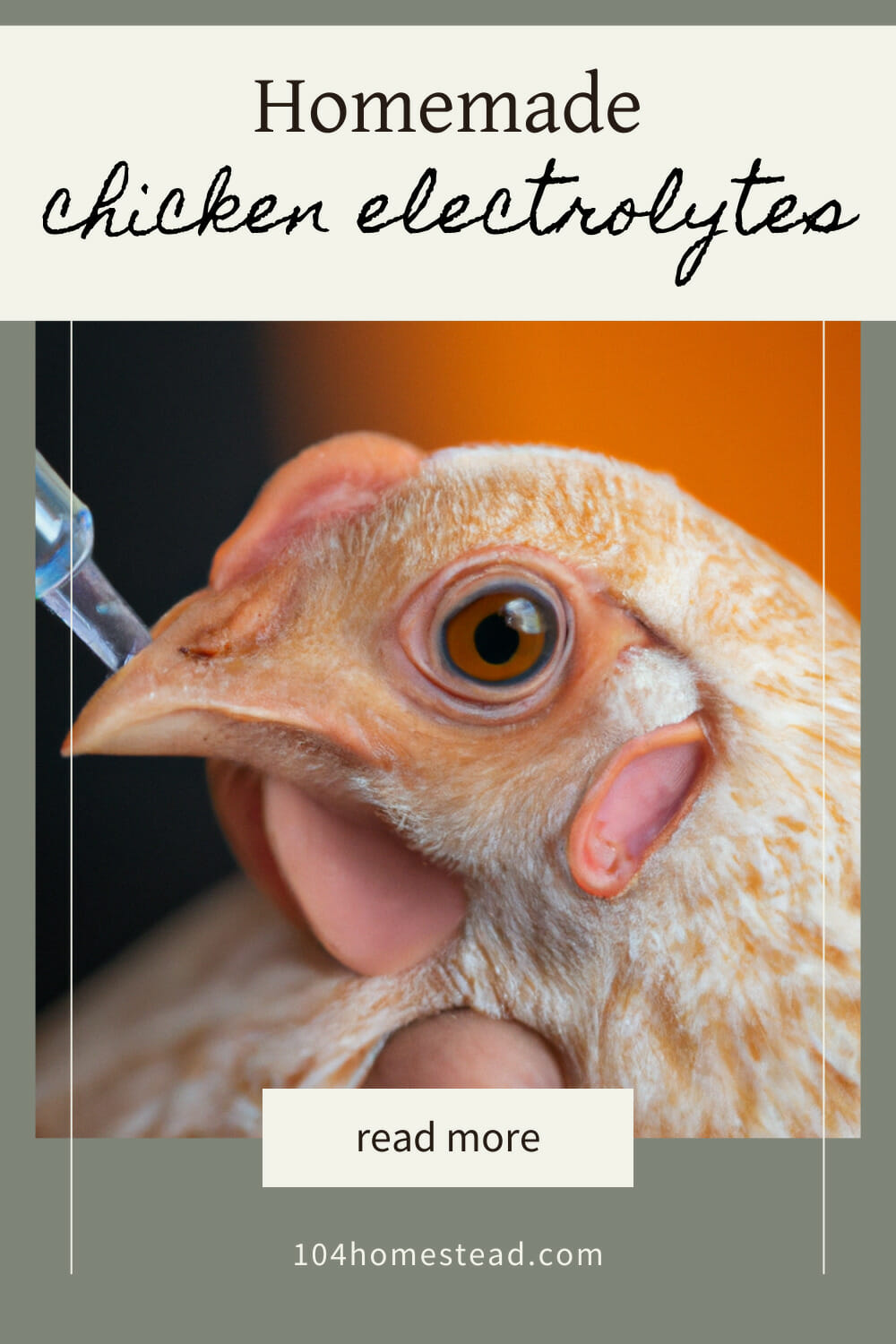A Guide to Preparing Homemade Electrolytes for Chickens
Homemade electrolytes are great for chickens because they are easy to prepare and much less expensive than store-bought solutions.

If you’ve been following our hatch progress on Facebook, you’ll know we’ve had quite some trouble this time around. Thankfully, despite the disastrous conditions, we only lost one duckling who pipped in the middle of the night and died by morning. Although I hate losing any, I didn’t think any would make it. Honestly, they shouldn’t have made it. Yet we have four beautiful ducklings.
If you’ve been following our hatch progress on Facebook, you’ll know we’ve had quite some trouble this time around. Thankfully, despite the disastrous conditions, we only lost one duckling who pipped in the middle of the night and died by morning. Although I hate losing any, I didn’t think any would make it. Honestly, they shouldn’t have made it. Yet we have four beautiful ducklings.
Since these little guys went through so much in the hatching process, I’ve got them on electrolytes to help give them a little boost. Electrolytes are just one of the things that you should have in your Poultry First Aid Kit.
UPDATE I’ve learned much about hatching ducks over the years and share my wisdom in How to Get a 60% Hatch Rate with Duck Eggs.
Although there are quite a few commercial electrolytes for poultry on the market, I prefer Sav-a-Chick Electrolyte Powder. It’s pre-measured, easy to find, made for poultry specifically, and contains vitamins A, E, D, C, and seven B vitamins.
The only thing I don’t love about it is that if you are dealing with a large flock, it’s a lot of packets to open. Also, it tends to stain light-colored/plastic water containers. That’s part of the reason I started making my own.
When to Use Electrolytes for Chickens
Chickens may require electrolytes in specific situations to maintain their overall health and well-being.
Extreme weather conditions, such as heatwaves or cold snaps, can be particularly challenging for chickens and often lead to dehydration. Electrolytes are vital in combating heat stress by replenishing essential minerals and fluids lost during these periods.
When chickens fall ill due to a respiratory infection or other diseases, they often experience decreased appetite and water intake symptoms. Providing them with homemade electrolytes can help restore their hydration levels and support their recovery.
Another instance where electrolytes can be beneficial for chickens is during transportation. The process of moving chickens from one location to another can be quite stressful for them, causing anxiety and dehydration as a result. Offering homemade electrolytes before, during, or after transportation can assist in minimizing the negative effects of stress and maintaining their electrolyte balance.
Introducing electrolytes to chickens experiencing significant stress can help boost their immune system and prevent them from succumbing to various health issues that may arise due to such stress.
It’s important to note that electrolytes should not be administered to chickens on a regular basis, as their water supply and feed should generally contain the necessary nutrients to meet their daily requirements. Homemade electrolytes should be reserved for specific situations when chickens are at an increased risk of dehydration or are in need of recovery support.
How to Use Homemade Electrolytes
Homemade electrolytes for chickens should generally be reserved for specific situations when chickens are at an increased risk of dehydration or in need of recovery support.
In an Emergency Situation
In emergency situations, administering homemade electrolytes to poultry can be done using the following steps:
- Prepare the electrolyte solution: Follow a trusted recipe, such as the one mentioned in the blog post, to prepare the electrolyte solution. Ensure all the ingredients are mixed thoroughly and dissolved.
- Offer the electrolyte solution: For severely dehydrated, stressed, or lethargic poultry, offering the electrolyte solution directly using a syringe or dropper is advisable. Gently open the bird’s beak and slowly administer the solution directly into their mouth, allowing them to swallow.
- Use a waterer or bowl: If the poultry is capable of drinking on their own, provide the electrolyte solution in a waterer or bowl. Ensure the chickens’ water container is clean and filled with the appropriate amount of electrolyte solution according to the recipe guidelines.
- Monitor their intake: Keep an eye on the poultry to ensure they are consuming the electrolyte solution. If necessary, gently encourage them to drink by lightly tapping the container or gently guiding their beak toward the waterer/bowl.
- Observe for improvement: Watch for signs of improvement in their overall condition, such as increased energy levels or improved hydration. If there is no improvement or their condition worsens, it is recommended to seek veterinary assistance.
Homemade Poultry Electrolyte Recipes
My Preferred Homemade Electrolyte Recipe
This is my go-to recipe when any of my poultry are dehydrated or stressed.
Ingredients
- 2 cups of warm water
- 2 tablespoons of brown sugar, honey, or molasses (I prefer molasses)
- 3-4 drops of Poly-Vi-Sol Infant Multivitamin
- 1/2 teaspoon of salt
- 1/2 teaspoon of baking soda
Instructions
Mix ingredients together and swirl until ingredients have dissolved. Keep the solution refrigerated. This solution can be used at full strength or diluted.
My Backup Recipe
This recipe isn’t quite as balanced as my preferred recipe, but it works in a pinch.
Ingredients
- 1 cup of warm water
- 2 teaspoons of sugar
- 1/8 teaspoon of salt
- 1/8 teaspoon of baking soda
Instructions
Mix ingredients together and swirl until dissolved. Add 1 cup of electrolyte solution for every 1 gallon of water.
Emergency Options
In an emergency, Gatorade or plain Pedialyte may be used. Do not use these regularly as they are higher in sodium and contain more sugars than the above-mentioned solutions.
What are the Ingredients in Homemade Electrolytes?
Why Are There Sugars in Electrolytes?
Sugar is included in homemade electrolytes for chickens because it helps provide a quick source of energy for the birds.
Birds may experience decreased appetite and nutrient intake. Adding a small amount of sugar, such as brown sugar, honey, or molasses, to the electrolyte solution can help stimulate their appetite and encourage them to drink the electrolyte solution. The sugar acts as a readily available energy source, providing a boost to their overall energy levels and helping to support their recovery.
Using sugar in moderation is important to prevent any negative impact on the chickens’ health.
Why is There Salt in Electrolytes?
Salt is included in homemade electrolytes for chickens because it is a crucial electrolyte that helps maintain proper hydration and fluid balance within the body. Electrolytes, including sodium from salt, play a vital role in regulating cell function and maintaining the body’s overall health. They help facilitate nerve function, muscle contractions, and the absorption of nutrients.
Adding a small amount of salt to the solution helps replenish the sodium levels lost during periods of dehydration or stress. Sodium helps the chickens retain water and prevents excessive water loss through urine. It also stimulates thirst, encouraging them to drink more and stay properly hydrated.
It’s essential to use salt in the appropriate amount. Too much salt can be harmful to chickens and lead to imbalances in their electrolyte levels.
Why is There Baking Soda in Electrolytes?
Baking soda is included in homemade electrolytes for chickens because it helps to balance the pH levels in their bodies. Chickens, like humans, have a specific pH range that is optimal for their overall health and physiological functions. Baking soda, also known as sodium bicarbonate, acts as a buffer to regulate the acid-base balance within the chicken’s system.
The body’s pH levels can become imbalanced when the bird is unwell. Adding a small amount of baking soda to the electrolyte solution helps restore and maintain the proper pH balance, ensuring that the chicken’s bodily functions can operate optimally. It can also aid in digestion by neutralizing excess stomach acid and reducing discomfort.
Storing The Electrolyte Solution
Storing homemade poultry electrolytes is important to ensure their effectiveness and longevity. Here are some guidelines on how to properly store them:
Use clean and sterilized containers.
Before storing the electrolyte solution, make sure to clean the containers you will be using thoroughly. Sterilize them by washing them with hot, soapy water or by sanitizing them in the dishwasher. This helps prevent any contamination that could affect the quality and safety of the electrolytes.
Refrigeration is preferable.
Homemade electrolytes should be stored in the refrigerator to maintain their freshness and inhibit bacterial growth. The low temperature of the refrigerator helps slow down the deterioration of the solution, preserving its effectiveness for a longer period. Make sure to seal the containers tightly to prevent any leakage or exposure to air.
Label and date the containers.
To keep track of the storage duration and avoid confusion, label each container with the date it was prepared. This way, you can easily identify the freshness of the electrolyte solution and ensure you are using it within a reasonable time frame.
Follow expiration guidelines.
While homemade electrolytes do not have an official expiration date like commercial products, using them within a reasonable time, generally within 1-2 weeks, is recommended. Always check for signs of spoilage, such as a change in color, odor, or the presence of mold. If any of these signs are observed, discard the solution immediately.
Helping Your Bird Beat the Heat
Help Livestock Deal with Summer Heat on the Homestead
Beat the Heat: How to Keep Your Chickens Cool this Summer
How to Keep Chickens Cool in Summer’s Heat
7 Ways To Keep Your Chickens Cool During Summer
Reducing Stress for Chickens
How To Help Your Hens Stress Less
Reducing Chicken Stress with Herbs
By being prepared with homemade electrolytes and understanding their appropriate usage, chicken owners can provide vital support to their flock when it is most needed. With proper care and attention, chickens can thrive and overcome various challenges, ensuring healthy chickens on the homestead.
If you’ve found value in this blog post and enjoyed reading it, why not share it with your Pinterest community? Pin the image below and spread the love!

